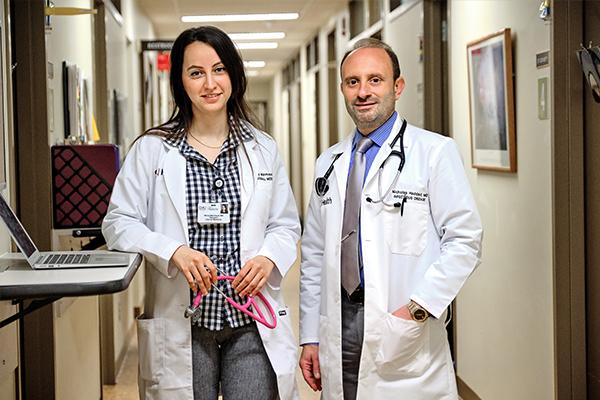
Academic Medicine Leader
"None of us saw this coming."
Those haunting words end a note from a University of Kentucky emergency medicine residency program director to colleagues that a resident had taken his own life. The note lamented that although the risk of suicide among physicians and trainees is higher than in the general public, it is not always made known and addressed.
"We must speak its names," he wrote.
Speaking the names — burnout and suicide — is what the faculty, staff and students at Central Michigan University's College of Medicine and its Saginaw residency program are doing strategically through mandatory awareness campaigns, stress reduction education and counseling.
Leading the awareness charge is Furhut Janssen, D.O., director of the psychiatry residency training program and College of Medicine assistant professor. She holds seminars for residents training at CMU and speaks on the topic to physicians locally and nationwide.
"You can't have intervention until you have awareness, and that awareness has to be in the people who are experiencing it," she said.
Physician suicide is a national problem, she demonstrates with a slide show of statistics. One of the most startling is that more than one physician a day commits suicide; and among medical students, suicide is the second most common cause of death.
Janssen decided to become involved because as a practicing psychiatrist many physicians would tell her that they were struggling with burnout and depression. She offered to help, but even after reassurance of privacy and offers of appointments with therapists or psychiatrists, they would not schedule an office visit. She knew why.
"There's a stigma with doctors seeking help," she said. "They are afraid of losing their jobs."
Her involvement and passion of raising awareness for prevention of physician suicide has grown. She now gives medical school lectures and public seminars, always hopeful that troubled doctors and others will recognize the seriousness of their feelings and get help.
Burnout is the most prevalent issue facing current physicians, statistics show. A 2018 Forbes article, citing a survey of doctors, said that 17 percent of doctors said they always felt burned out, and 34 percent said they often felt that way.
Modern technology has worsened the problem and taken away the art of practicing, Janssen said. The advent of electronic health records and productivity metrics have taken away much of the joy from the patient-doctor encounter, multiple reports and media have shown.
Efforts to keep stress in check begin at orientation to CMU's College of Medicine.
"Student stress is a reality in medical school, and for many students it starts even before they get to campus," said Tina Thompson, senior associate dean of academic affairs.
Navigating a new curriculum, loss of established support networks and fear of failure can lead to anxiety, self-doubt and the imposter syndrome, she said.
CMU's Office of Student Affairs has developed a wellness program that teaches students how to manage stress.
Among the topics discussed are sleep habits, exercise options, relaxation techniques, physical and mental health, music therapy, and supportive relations.
Required courses also include coping techniques, and faculty and staff are trained to notice and report issues before they can snowball, she said.
"We can deal with burnout if they get there, but our goal is to never let them get to that point." – Bethany Figg, graduate medical education accreditation manager
Burnout awareness and avoidance techniques are part of required well-being training for all residents, led by Dr. Mary Jo Wagner, chief academic officer at CMU Medical Education Partners; and Bethany Figg, graduate medical education accreditation manager.
"We can deal with burnout if they get there, but our goal is to never let them get to that point," Figg said.
The training is through a number of workshops on stress management. Saginaw-based Covenant HealthCare and St. Mary's of Michigan, partners with the residency program, help with much of the training.
Stress outlets include massage therapy, exercise and stretching, an interfaith wellness panel, and a resident wellness committee that plans activities outside work, including sports, parties, music and art contests.
"We put a lot of heart into what we do," Figg said.
Maryssa Lyons, a third-year medical student from Freeland, Michigan, spearheaded this spring's student-led burnout and suicide prevention program. It was started the previous year by medical student Brittany Fields, and Lyons got involved because of her own struggles with mental health as a high school student, she said.
Their effort included a poster campaign, a workshop, a TED Talk, speeches and a fun night. She said the effort has received great support from faculty and students, including funding from the College of Medicine.
Other medical schools around the state have shared information and are now beginning similar programs. Last spring, Wayne State and Michigan State held their programs concurrently with CMU's.
Lyons' goal is a statewide program to create a culture where the topic is dealt with openly.
"I want to build a medical community that has colleagues who are mindful of their colleagues' needs and help each other grow."
Plus, she said, "Talking about mental health and tackling these hard topics will only help me in my future career as a psychiatrist."
College of Medicine students also were involved this spring in a successful effort by the Saginaw County Medical Society to persuade the American Medical Association to adopt a new policy to increase awareness and physician training on recognizing potential suicide risks among patients.
College of Medicine Dean George Kikano has instituted mandatory suicide awareness training at the college, and it is expected that more than 400 medical students will take part in the safeTALK training this year. Members of future incoming classes also will be trained.